Japan made them famous in the 1960s, South Korea has been marketing the concept for years and now Taiwan is designing some of the most luxurious love hotels in the business. In the last five-years, they have transformed their dated image of sleazy, windowless rooms into a multi-billion dollar industry.
"It is no longer necessary for lovers to resort to cheap or dirty rooms when they want to spend a few hours alone," said WeGo Taipei manager Henry Bai (
WeGo Motel (
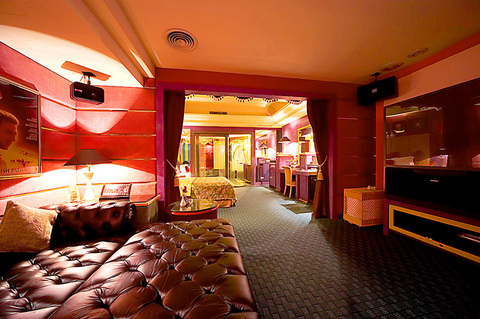
PHOTOS COURTESTY OF WEGO
"We don't want to convey a sex hotel image, so we don't put much sex equipment [paraphernalia] in the rooms. We are branding the love motel concept, with an emphasis on style and luxury," Bai said.
LOVE AND RIVALRY
Riding on the success of WeGo's hedonist paradise are a growing number of love villas in Taichung, and Kaohsiung, which boast larger, more extravagant rooms. One of the latest and most upscale additions to the market is Mulan Motel (
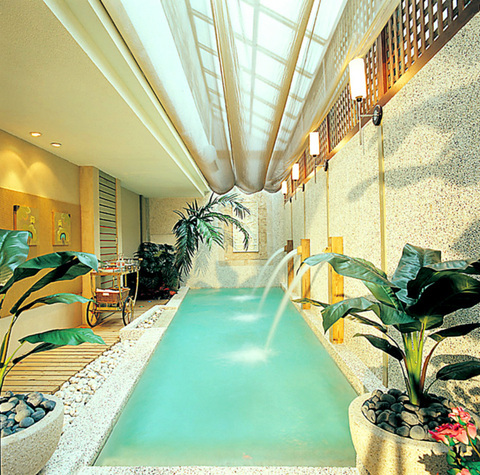
PHOTOS COURTESY OF IMORE
The high price of land in Taipei has kept WeGo's competitors to a minimum. On a similar sized plot of land, I MORE Motel (
Opened in December last year, I MORE's rooms are clearly bigger than those at WeGo, but use the same theme-style approach in their interior decoration. In addition to the queen-sized bedroom furniture is a variety of recreational equipment from big screen TV's (often more than one) and karaoke to rooms fitted with a private pool. Bathrooms are the main attraction, however, with a sauna, shower and party-sized hot tub in every room. The major difference between the two motels is I MORE's emphasis on sex with its sex-toy slot machines and selection of imported mechanical sex chairs. The motel also hired two actors to demonstrate 48 positions for an instructional program that plays on one of the many available adult channels.
Clients range in age from 25 to 50, but despite the queue of luxury sedans driving in, rooms are not always occupied by the wealthy.
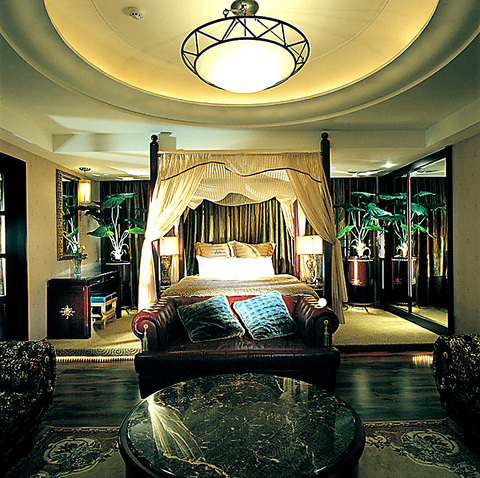
"Maybe they are not rich, but they will spend the money on a motel, because for a short time they can be treated and pretend like they are rich," said I MORE marketing manager Kyle Lai (
Wealthy or not, those dreams come with a hefty price tag.
A two hour "rest" at either motel can cost upward of NT$2,500, or NT$6,800 for 12 hours. For a large number of couples, however, it remains a small price to pay. An average day at WeGo Taipei sees 500 couples, which even at the least expensive rate of NT$1,500, translates as NT$750,000 per day. Weekends and rainy days draw an even larger turnover resulting in a queue of cars waiting three to four hours, Bai said. Both have overfill parking lots for patrons willing to wait it out.
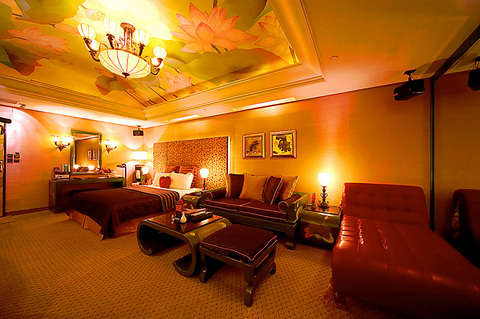
CLEANING UP
Once inside guests are treated with superior service. Both WeGo and I MORE have ISO 9001 certification, which assumes an international standard of quality in the hospitality industry. Cleaning procedures demand three housekeepers to clean one room, which is inspected prior to being rented out. Both motels claimed housekeepers spend 20 to 30 minutes per room. Bathrooms and bedrooms are also stocked with a wide selection of toiletries and confectioneries that compare, if not exceed in quantity, those found in a five-star hotel. Despite the comparable room prices and standards to fashionable business hotels, love motels are for couples only. No more and no less than two people are permitted in a room at one time, and no entrance is permitted to anyone below18 years of age.
Love motels, new and old, are viewed as models of discretion, according to Lai, who assures anonymity and said guests rarely see the staff.
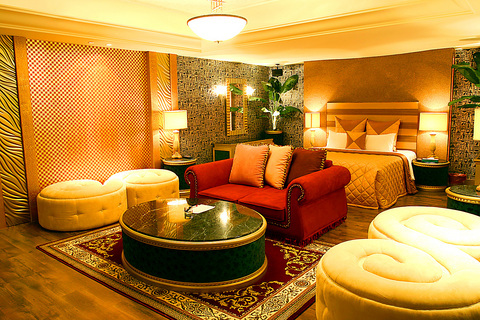
Normally, a receptionist sits in a booth at the entrance of the building greeting drivers and directing them to a room. A garage door automatically opens and closes once the car enters. Any room service is delivered to a special area outside the door, after which the wait staff leaves and notifies the guests by telephone that the food has arrived. I MORE has a separate hallway accessible only to the housekeeping "or guests in need of an escape route," Lai said.
WeGo doesn't have a secret passageway but it does have a pre-recorded soundtrack device that, with a a flick of the remote, will reproduce the background noise heard at a MRT station, beach or office when making a phone call.
Designed for love, the motels are setting hospitality standards. "Romance motels are designing some of the most luxurious, high-tech rooms in the country," Lai said.
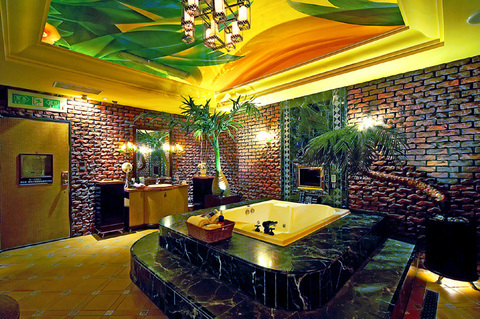
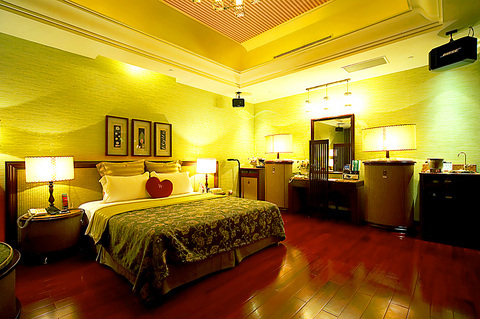

On April 26, The Lancet published a letter from two doctors at Taichung-based China Medical University Hospital (CMUH) warning that “Taiwan’s Health Care System is on the Brink of Collapse.” The authors said that “Years of policy inaction and mismanagement of resources have led to the National Health Insurance system operating under unsustainable conditions.” The pushback was immediate. Errors in the paper were quickly identified and publicized, to discredit the authors (the hospital apologized). CNA reported that CMUH said the letter described Taiwan in 2021 as having 62 nurses per 10,000 people, when the correct number was 78 nurses per 10,000

As we live longer, our risk of cognitive impairment is increasing. How can we delay the onset of symptoms? Do we have to give up every indulgence or can small changes make a difference? We asked neurologists for tips on how to keep our brains healthy for life. TAKE CARE OF YOUR HEALTH “All of the sensible things that apply to bodily health apply to brain health,” says Suzanne O’Sullivan, a consultant in neurology at the National Hospital for Neurology and Neurosurgery in London, and the author of The Age of Diagnosis. “When you’re 20, you can get away with absolute

May 5 to May 11 What started out as friction between Taiwanese students at Taichung First High School and a Japanese head cook escalated dramatically over the first two weeks of May 1927. It began on April 30 when the cook’s wife knew that lotus starch used in that night’s dinner had rat feces in it, but failed to inform staff until the meal was already prepared. The students believed that her silence was intentional, and filed a complaint. The school’s Japanese administrators sided with the cook’s family, dismissing the students as troublemakers and clamping down on their freedoms — with

As Donald Trump’s executive order in March led to the shuttering of Voice of America (VOA) — the global broadcaster whose roots date back to the fight against Nazi propaganda — he quickly attracted support from figures not used to aligning themselves with any US administration. Trump had ordered the US Agency for Global Media, the federal agency that funds VOA and other groups promoting independent journalism overseas, to be “eliminated to the maximum extent consistent with applicable law.” The decision suddenly halted programming in 49 languages to more than 425 million people. In Moscow, Margarita Simonyan, the hardline editor-in-chief of the